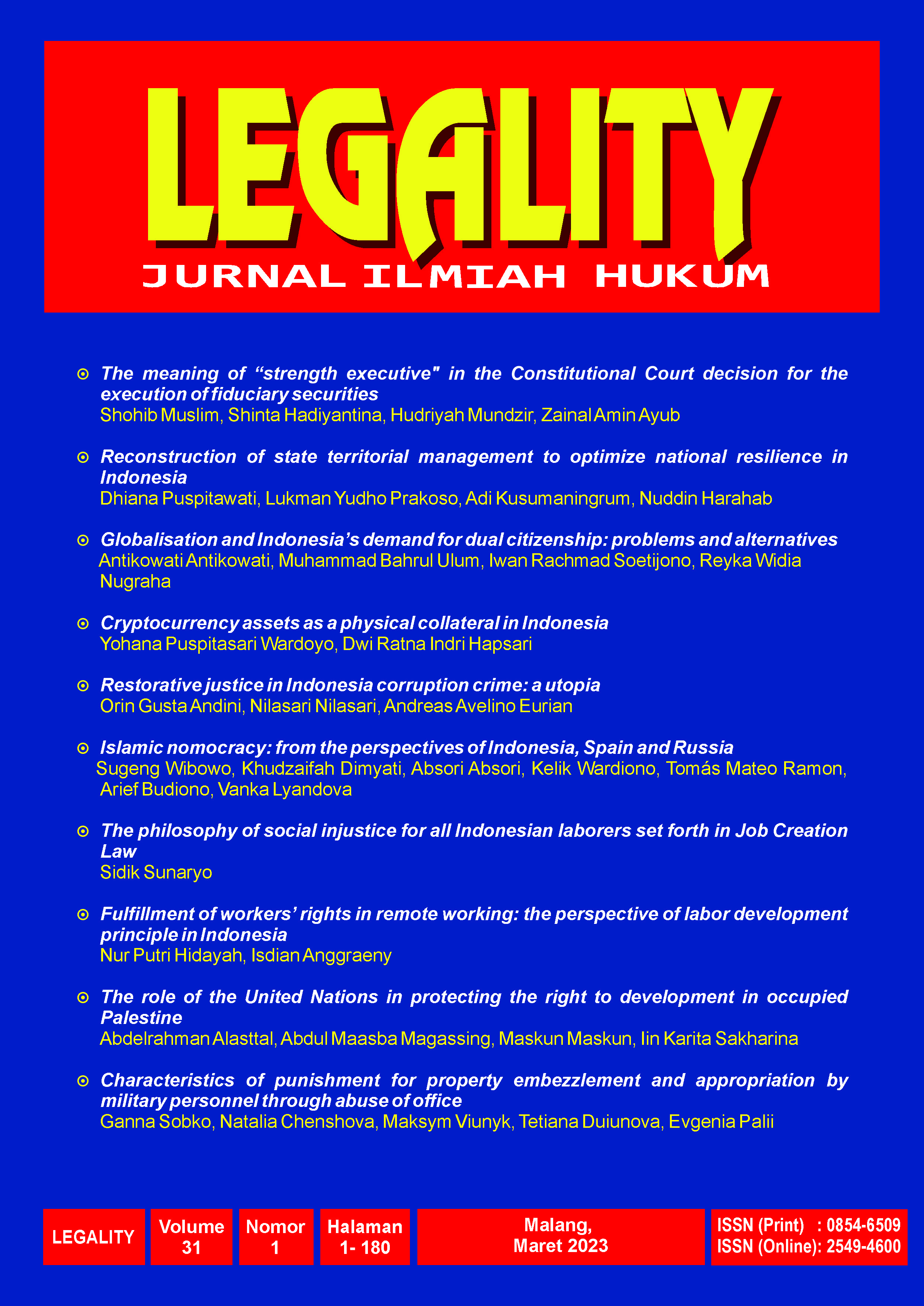Islamic nomocracy: from the perspectives of Indonesia, Spain and Russia
DOI:
https://doi.org/10.22219/ljih.v31i1.25358Keywords:
Islamic nomocracy, Science, Religion, Public spacesAbstract
The Indonesian Islamic nomocracy paradigm has a long history and a cultural relationship with the national struggle that coincides with political and religious orientations. The Islamic nomocracy is inseparable from the relationship between Islam and the state rather than being linked to Islamic doctrine and power. This research employed the normative sociological method. It used a philosophical approach from Barbour’s paradigm of the relationship between religion and science and Habermas’ thought on religion in public spaces. This research strives to analyze the Islamic nomocratic paradigm pattern prior to Indonesian independence as a crucial stage that influences the following eras, namely the post-independence era, the Old Order Era, the New Order Era, and the Post-Reformation era up to now. This research aims to find the basics and the development of the Islamic nomocracy in the Indonesian legal system. The roots of the Islamic nomocracy legal thought in Indonesia can be traced to the pre-independence era. In the development of Islamic kingdoms, there was a dialog and integration process between the Islamic nomocracy and the kingdom government. After the War of Java, the conflict and independence pattern was formed. Before Indonesian independence, the Islamic nomocracy thought developed into Pan Islamism which tended to be conical to legal formalization through the caliphate system. After Indonesia’s independence, some of the Islamic nomocracy legal thought recognized the state as one of the legal systems in Indonesia besides customary law and positive law. Then, Indonesia became a partly-Islamic Legal State with a constant up-and-down relationship with the state. The authors also completed this paper with perspectives of Spain and Russia as both have been ruled under Muslim governance.
Downloads
References
Abdullah, Taufik. (1987). Islam dan Masyarakat: Pantulan Sejarah Indonesia (Islam and Society: A Reflection of the Indonesian History). LP3ES.
Abdullah, Taufiq, & Hisyam, M. (2003). Sejarah Umat Islam Indonesia (The History of Indonesian Muslims). Kerjasama MUI dan Yayasan Pustaka Umat.
Afifi, I. (2002). Saya, Jawa dan Islam (I, Javanese and Muslim) (VI). Penerbit Pojok Cerpen dan Tanda Baca.
Alamsyah, R. (2021). Pengaruh Teori Receptie dalam Politik Hukum Kolonial Belanda Terhadap Hukum Islam dan Hukum Adat Dalam Sejarah Hukum Indonesia (The Influence of the Receptie Theory in the Dutch Colonial Legal Politics on Islamic and Customary Law in Indonesia’s Legal His. Petita, 3(2), 343–362. https://doi.org/10.33373/pta.v3i2.3875
Anshari, E. S. (1997). Piagam Jakarta 22 Juni 1945: Sebuah Konsensus Nasional tentang Dasar Negara Republik Indonesia (1945-1949) (The Jakarta Charter of 22 June 1945: A National Consensus on the Republic of Indonesia’s State Foundation). Gema Insani Pers.
Anwar, M. S. (1995). Pemikiran dan Aksi Islam Indonesia (The Thoughts and Actions of Islam in Indonesia). Paramadina.
Astor, A., & Griera, M. (2016). The management of religious diversity in contemporary Spain. In Anuario CIDOB de la Inmigración 2015–2016 (pp. 248–270). Bellaterra. https://doi.org/10.24241/AnuarioCIDOBInmi.2016.248
Aulia, F., & Al-Fatih, S. (2017). Perbandingan Sistem Hukum Common Law, Civil Law dan Islamic Law dalam Perspektif Sejarah dan Karakteristik Berpikir . Legality : Jurnal Ilmiah Hukum, 25(1), 98–113. http://202.52.52.22/index.php/legality/article/view/5993
Azhary, M. T. (1992). Negara Hukum: Suatu Studi tentang Prinsip-prinsipnya Dilihat dari Segi Hukum Islam, Implementasinya pada Periode Negara Madinah dan Masa Kini (The rule of law: a study of its principles from the perspective of Islamic law, its implementation in the Medina (4th ed.). Kencana Prenada Media.
Babich, I. L., Bram, C., Erciyes, C., Meskhidze, J., & Richmond, W. (2007). Ethno-Nationalism, Islam and the State in the Caucasus (Post-Soviet Disorder) (M. Gammer (ed.); 1st ed.). Routledge. https://doi.org/10.4324/9780203933794
Becker, S. (1986). Contributions to a Nationalist Ideology: Histories of Russia in the First Half of the Nineteenth Century. Russian History, 13(4), 331–353. https://brill.com/view/journals/ruhi/13/1/article-p331_14.xml
Čech, Ľ. (2022). Islam in the History of Russia: Confrontation vs. Cooperation. The Euraseans: Journal on Global Socio-Economic Dynamics, 1(32), 100–105. https://doi.org/10.35678/2539-5645.1(32).2022.99-105
Cervi, L. (2020). Exclusionary Populism and Islamophobia: A Comparative Analysis of Italy and Spain. Religions, 11(10), 1–21. https://doi.org/10.3390/rel11100516
Deflem, M. (2013). The Legal Theory of Jurgen Habermas (Law and Social Theory) (2nd ed.). Hart Publishing.
Dijk, K. Van. (2003). Kekacauan dan Kerusuhan: Tiga Tulisan Tentang Pan Islamisme di Hindia Belanda pada Akhir Abad Kesembilan Belas dan Awal Abad Kedua Puluh (Chaos and Conflicts: Three Papers on Pan Islamism in Dutch East Indies at the End of the Ninteenth Cuntury and the St (N. J. G. Kaptain (ed.)). Seri INIS XLIII.
Dimyati, K. (2005). Teorisasi Hukum: Studi Tentang Perkembangan Pemikiran Hukum di Indonesia 1945-1990 (Legal Theorization: A Study on the Development of the Legal Thought in Indonesia 1945-1990). Muhammadiyah University Press.
Dimyati, K., & Wardiono, K. (2004). Metode Penelitian Hukum (Legal Research Method). UMS Press.
Elahi, F., & Khan, O. (2017). Islamophobia: Still A Challenge For Us All. Runnymedetrust.
Fadhlan, A. I. Al. (1996). Risalat Ibn Fadlān fi wasfi al-Rihlah ila Bilād al-Turk wa al-Khazr wa al-Rūs wa al-Saqālabah. Bayt al hikma.
Fadlan, A. I. (2012). Land of Darkness: Arab Travellers in the Far North. Penguin.
Farkhani, Baidhawy, Z., & Kuswaya, A. (2021). Islamophobia in Spain: Inheritance of Reconquista and Hate Political Rhetoric. Journal of Al-Tamaddun, 16(1), 65–79. https://doi.org/10.22452/JAT.vol16no1.5
Fundación Pluralismo y Convivencia (Funding Convention on Pluralism). (2021). Memoria de Actividades (Activity Notes) 2020. FPC.
Giuliano, E. (2005). Islamic Identity and Political Mobilization in Russia: Chechnya and Dagestan Compared. Nationalism and Ethic Politic, 11(2), 215. https://doi.org/10.1080/13537110591005711
Golden, P. B. (1992). An Introduction to the History of the Turkic Peoples: Ethnogenesis and State-Formation in Medieval and Early Modern Eurasia and the Middle East.
Goodwin, M. J., Raines, T., & Cutts, D. (2017). What do Europeans think about Muslim immigration? Chatham House.
Habermas, J. (2010). Between Naturalism and Religion. Polity Press.
Hahn, J. W. (1991). Developments in Soviet Local Politics’. In J. Alfred & A. Z. Rubinstein (Eds.), Perestroika at the Crossroads. M. E. Sharpe.
Halim, H., Yusoff, K., Ahmad, S., Khir, M. F. A., Abdullah, A. H., Aziz, H. S., Saad, S. S., & Sulaiman, A. (2018). Ibn Fadlan’s Role in The Islamisation of Bulghar Society. International Journal of Engineering & Technology, 49(4). https://core.ac.uk/download/pdf/287743877.pdf
Halkis, M. (2017). Konstelasi Politik Indonesia: Pancasila Dalam Analisis Fenomenologi Hermeneutika (The Indonesian Political Constelation: Pancasila in the Hermeneutical Phenomenological Analysis). Yayasan Pustaka Obor Indonesia.
Hitchins, K. (1997). Islamisation and Native Religion in the Golden Horde [Review Article] Devin De Weese in Baba Tükles and Conversion to Islam in Historical and Epic Tradition. Central Asiatic Journal, 41(1), 128–130. https://www.jstor.org/stable/41928095?casa_token=lf95V4UuzusAAAAA%3AabWa9c2AMkgIzKhQOoceyxaYD5m0wM9EdoS_G9U7EVB5kaUU8idCiQuwQoxg4Ot9PQaBZOSi7cIJPRh_nN965jBgfSBOy-0eaa909St1_2bZdedcuZRR
Ibrahim, I. (2010). Agama, Negara dan Ruang Publik Menurut Habermas (Catatan Penting Untuk Pluralisme Agama di Indonesia). Jurnal Badati, 2(3). https://www.researchgate.net/profile/Ibrahim-Ibrahim-31/publication/pdf
Karimova, L. (2016). (Re)constructing Muslim Identities from the Soviet Past: Muslim Tatar Women’s Stories of Soviet Moral Selves. Central Asian Affairs, 3, 117–141. https://brill.com/view/journals/caa/3/2/article-p117_2.xml
Kumar, D. (2010). Framing Islam: The Resurgence of Orientalism during the Bush II Era. Journal of Communication Inquiry, 34(3), 254 –277. https://doi.org/10.1177/0196859910363174
Lems, J. M. (2021). Staying silent or speaking up: Reactions to racialization affecting Muslims in Madrid. Ethnic and Racial Studies, 44(7), 1192–1210. https://doi.org/10.1080/01419870.2020.1779949
Lems, J. M., & Contreras, A. I. P. (2023). Struggling with and against the Governance of Islam in Spain. Religions, 14(3), 306. https://doi.org/10.3390/rel14030306
Lesmana, D., & Mahyudin, E. (2018). Relevansi Agama dan Sains Menurut Ian G. Barbour Serta Ide Islamisasi Sains. Jurnal Mustaqim, 1(1), 21–44. https://doi.org/10.46257/mutsaqqafin.v1i01.50
Lomba, A. (2003). Kolonialisme/Pascakolonialisme (Colonialism/Postcolonialism). Bentang.
Mako, G., & Simonsohn, U. (2020). The Conversion of the Volga Bulghars. University of California Press.
Mazarío, C., & María, J. (2018). Muslims in Spain, The legal framework and status, In Observing Islam in Spain, Contemporary Politics and Social Dynamics (A. I. P. Contreras (ed.)). Brill. https://doi.org/10.1163/9789004364998_003
Menoh, G. A. B. (2015). Agama Dalam Ruang Publik (Hubungan Antar Agama dan Negara Dalam Masyarakat Postsekuler Menurut Jurgen Habermas) (Religion in Public Spaces, the Relationship Between Religion and the State in Post Secular Societies According to Jurgen Habermas). Kanisius.
Mosses, J. C. (1992). Soviet Provincial Politics in an Era of Transition and Revolution, 1989–91. Soviet Studies, 44(3), 479–509. https://doi.org/10.1080/09668139208412026
Nasihin. (2012). Syariat Islam Mencari Ideologi 1924-1945 (The Islamic Sharia Seeking an Ideology 1924-1945). Pustaka Pelajar.
Pankin, B. (1996). The Last Hundred Days of the Soviet Union. I. B. Tauris.
Pickel, G., & Öztürk, C. (2018). Islamophobia Without Muslims? The “Contact Hypothesis” as an Explanation for Anti-Muslim Attitudes – Eastern European Societies in a Comparative Perspective. Journal of Nationalism, Memory and Language Politics, 12(2), 162–191. https://doi.org/10.2478/jnmlp-2018-0009
Pilkington, H., & Yemelianova, G. (2016). Islam in Post-Soviet Russia. Routledge.
Rodinson, M. (1979). The Arabs. University of Chicago Press.
Rorlich, A. (1986). The Volga Tatars. A Profile in National Resilience. Stanford University.
Rubin, D. (2018). Russia’s Muslim Heartlands: Islam in the Putin Era (XIII). C Hurst and Co.
Ruble, B., & Arel, D. (2008). A discussion of Euro-Islam: a moderate set of beliefs that accepts rule by a secular state (Re-Bounding Identities in Russia and Ukraine). Johns Hopkins University Press.
Said, E. W. (2016). Orientalisme: Menggugat Hegemoni Barat dan Mendudukkan Timur Sebagai Subyek (Orientalism: Suing the Western Hegemony and Placing the East as the Subject). Pustaka Pelajar.
Sakwa, R. (1993). Russian Politics and Society (2nd ed.). Routledge.
Salguero, O., & Siguero, A. (2021). La cuestión funeraria islámica: el “enquistado” caso de la metrópolis madrileña [The Islamic burial question: The “frozen” case of the Madrid metropolis]. Revista de Estudios Internacionales Mediterráneos, 31, 108–127. https://pesquisa.bvsalud.org/global-literature-on-novel-coronavirus-2019-ncov/resource/pt/covidwho-1579702
Santi, S. (2018). Relasi Agama dan Sains Menurut Sayyed Hosein Nasr dan Ian Barbour. Prosiding Konferensi Integrasi Interkoneksi Islam Dan Sains, 1, 171–176. http://sunankalijaga.org/prosiding/index.php/kiiis/article/view/29
Schamiloglu, U. (2007). The formation of a Tatar historical consciousness: Şihabäddin märcani and the image of the golden horde. Central Asian Survey, 9(2), 39–49. https://doi.org/10.1080/02634939008400697
Subair, S. (2015). Abangan, Santri, Priyayi: Islam dan Politik Identitas Kebudayaan. Dialektika, 9(2), 34–36. https://jurnal.iainambon.ac.id/index.php/DT/article/viewFile/228/171
Suminto, A. (1985). Politik Islam Hindia Belanda, Hed Kantoor Voor Inlandshe Zaken (The Dutch East Indies Islamic Politics). LP3ES.
Sunarko, A. (2010). Dialog Teologis Dengan Jurgen Habermas (A Theological Dialog with Jurgen Habermas)’, in Dialektika Sekulerisasi: Diskusi Habermas –Ratzinger Dan Tanggapan, ed. by Paul Budi Kleden and A. Sunarko. Lamatera.
Symasudin, D. (2018). ‘Perda Syariah, Mengapa? (The Sharia Regional Regulation, Why?)’, in Ma’mun Murod Al-Barbasy: Politik Perda Syariah Dialektika Islam Dan Pancasila Di Indonesia. Suara Muhammadiyah.
Yemelianova, G. (1999). Ethnic Nationalism, Islam and Russian Politics in the North Caucasus. In C. Williams & T. Sfikas (Eds.), Ethnicity and Nationalism in Russia, the CIS and the Baltic States (pp. 120–148). Ashgate.
Zuhraini, Z. (2014). Kontribusi Nomokrasi Islam (Rule of Islamic Law) Terhadap Negara Hukum Pancasila. Al-Adalah, 12(1), 171–190. https://doi.org/10.24042/adalah.v12i1.182
Downloads
Published
How to Cite
Issue
Section
License
Copyright (c) 2023 Sugeng Wibowo, Khudzaifah Dimyati, Absori Absori, Kelik Wardiono, Tomás Mateo Ramon, Arief Budiono, Vanka Lyandova

This work is licensed under a Creative Commons Attribution-ShareAlike 4.0 International License.










